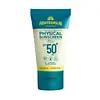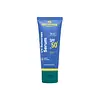What's inside
What's inside
 Key Ingredients
Key Ingredients

 Benefits
Benefits

 Concerns
Concerns

 Ingredients Side-by-side
Ingredients Side-by-side

Water
Skin ConditioningZinc Oxide
Cosmetic ColorantCyclohexasiloxane
EmollientButyloctyl Salicylate
Skin ConditioningPropanediol
SolventDicaprylyl Carbonate
EmollientPropylheptyl Caprylate
EmollientDisiloxane
Skin ConditioningTrimethylsiloxysilicate
EmollientPentylene Glycol
Skin ConditioningLauryl Polyglyceryl-3 Polydimethylsiloxyethyl Dimethicone
Skin Conditioning1,2-Hexanediol
Skin ConditioningDisteardimonium Hectorite
StabilisingMagnesium Sulfate
Polyglyceryl-2 Dipolyhydroxystearate
Skin ConditioningIsododecane
EmollientTriethoxycaprylylsilane
Acrylates/Polytrimethylsiloxymethacrylate Copolymer
Skin ConditioningPolyhydroxystearic Acid
EmulsifyingHydroxyacetophenone
AntioxidantDimethicone
EmollientPolyglyceryl-4 Diisostearate/Polyhydroxystearate/Sebacate
EmulsifyingLecithin
EmollientEthylhexyl Palmitate
EmollientIsostearic Acid
CleansingIsopropyl Myristate
EmollientDipotassium Glycyrrhizate
HumectantPolyglyceryl-3 Polyricinoleate
EmulsifyingHouttuynia Cordata Extract
Skin ConditioningHelianthus Annuus Seed Oil
EmollientTocopherol
AntioxidantEthyl Ferulate
AntioxidantRosmarinus Officinalis Leaf Extract
AntimicrobialButylene Glycol
HumectantWater, Zinc Oxide, Cyclohexasiloxane, Butyloctyl Salicylate, Propanediol, Dicaprylyl Carbonate, Propylheptyl Caprylate, Disiloxane, Trimethylsiloxysilicate, Pentylene Glycol, Lauryl Polyglyceryl-3 Polydimethylsiloxyethyl Dimethicone, 1,2-Hexanediol, Disteardimonium Hectorite, Magnesium Sulfate, Polyglyceryl-2 Dipolyhydroxystearate, Isododecane, Triethoxycaprylylsilane, Acrylates/Polytrimethylsiloxymethacrylate Copolymer, Polyhydroxystearic Acid, Hydroxyacetophenone, Dimethicone, Polyglyceryl-4 Diisostearate/Polyhydroxystearate/Sebacate, Lecithin, Ethylhexyl Palmitate, Isostearic Acid, Isopropyl Myristate, Dipotassium Glycyrrhizate, Polyglyceryl-3 Polyricinoleate, Houttuynia Cordata Extract, Helianthus Annuus Seed Oil, Tocopherol, Ethyl Ferulate, Rosmarinus Officinalis Leaf Extract, Butylene Glycol
Water
Skin ConditioningEthylhexyl Salicylate
UV AbsorberOctocrylene
UV AbsorberHomosalate
Skin ConditioningGlycerin
HumectantPropylene Glycol
HumectantNylon-12
Cyclopentasiloxane
EmollientBis-Ethylhexyloxyphenol Methoxyphenyl Triazine
Skin ConditioningGlyceryl Stearate
EmollientPolymethyl Methacrylate
Silica
AbrasivePhenoxyethanol
PreservativeCeteareth-20
CleansingCeteareth-12
EmulsifyingCetearyl Alcohol
EmollientCetyl Palmitate
EmollientSodium Laureth Sulfate
CleansingDimethicone/Vinyl Dimethicone Crosspolymer
Skin ConditioningAcrylates/C10-30 Alkyl Acrylate Crosspolymer
Emulsion StabilisingTriethanolamine
BufferingTriethylene Glycol
MaskingAminomethyl Propanol
BufferingHelianthus Annuus Seed Oil
EmollientPicea Mariana Bark Extract
AntioxidantEthyl Ferulate
AntioxidantRosmarinus Officinalis Leaf Extract
AntimicrobialTocopherol
AntioxidantEriophorum Spissum Flower/Stem Extract
Skin ConditioningWater, Ethylhexyl Salicylate, Octocrylene, Homosalate, Glycerin, Propylene Glycol, Nylon-12, Cyclopentasiloxane, Bis-Ethylhexyloxyphenol Methoxyphenyl Triazine, Glyceryl Stearate, Polymethyl Methacrylate, Silica, Phenoxyethanol, Ceteareth-20, Ceteareth-12, Cetearyl Alcohol, Cetyl Palmitate, Sodium Laureth Sulfate, Dimethicone/Vinyl Dimethicone Crosspolymer, Acrylates/C10-30 Alkyl Acrylate Crosspolymer, Triethanolamine, Triethylene Glycol, Aminomethyl Propanol, Helianthus Annuus Seed Oil, Picea Mariana Bark Extract, Ethyl Ferulate, Rosmarinus Officinalis Leaf Extract, Tocopherol, Eriophorum Spissum Flower/Stem Extract
 Reviews
Reviews

Ingredients Explained
These ingredients are found in both products.
Ingredients higher up in an ingredient list are typically present in a larger amount.
Ethyl ferulate is an antioxidant derived from ferulic acid and ethyl alcohol. You'll most likely see this ingredient in sunscreens.
One study from 2014 found a concentration of 10% showed a similar SPF to Benzimidazole. Though this is considered a chemical UV filter, this ingredient is not listed as so. This is due to regulatory loopholes. You'll likely find this ingredient in "100% mineral" sunscreens.
This ingredient is typically found in concentrations between 0.5-1%. It is usually created synthetically or from rice bran oil.
Learn more about Ethyl FerulateHelianthus Annuus Seed Oil is the oil derived from the seeds of a Sunflower. Sunflower seed oil is non-fragrant. It is an emollient, meaning it helps to soften the skin.
Sunflower seed oil contains many fatty acids. The fatty acids found in sunflower seeds include (from highest amount to least): linoleic acid, myristic acid, palmitic acid, stearic acid, arachidic acid, oleic acid, and linolenic acid.
These fatty acids help the skin create ceramides. Ceramides play a role in repairing the skin barrier.
Helianthus Annuus Seed Oil helps moisturize the skin. This in turn helps the skin look more rejuvenated and smoother.
Sunflowers are rich in vitamin E.
Historians believe Indigenous cultures of North America domesticated sunflowers before corn. Thus they relied on sunflower oil for a variety of uses. One such use is moisturizing skin and hair.
Sunflower seed oil may not be fungal acne safe. We recommend speaking with a professional if you have any concerns.
Learn more about Helianthus Annuus Seed OilRosmarinus Officinalis Leaf Extract comes from rosemary. Rosemary is native to the Mediterranean.
While Rosmarinus Officinalis Leaf Oil can be volatile due to its fragrant properties, the fragrance components are usually removed in the leaf extract.
Rosemary Leaf Extract contains many antioxidants such as rosmarinic acid and caffeic acid. Rosemarinic acid, a compound found in rosemary leaf, has been found to help soothe skin conditions such as eczema and acne.
Learn more about Rosmarinus Officinalis Leaf ExtractTocopherol (also known as Vitamin E) is a common antioxidant used to help protect the skin from free-radicals and strengthen the skin barrier. It's also fat soluble - this means our skin is great at absorbing it.
Vitamin E also helps keep your natural skin lipids healthy. Your lipid skin barrier naturally consists of lipids, ceramides, and fatty acids. Vitamin E offers extra protection for your skin’s lipid barrier, keeping your skin healthy and nourished.
Another benefit is a bit of UV protection. Vitamin E helps reduce the damage caused by UVB rays. (It should not replace your sunscreen). Combining it with Vitamin C can decrease sunburned cells and hyperpigmentation after UV exposure.
You might have noticed Vitamin E + C often paired together. This is because it is great at stabilizing Vitamin C. Using the two together helps increase the effectiveness of both ingredients.
There are often claims that Vitamin E can reduce/prevent scarring, but these claims haven't been confirmed by scientific research.
Learn more about TocopherolWater. It's the most common cosmetic ingredient of all. You'll usually see it at the top of ingredient lists, meaning that it makes up the largest part of the product.
So why is it so popular? Water most often acts as a solvent - this means that it helps dissolve other ingredients into the formulation.
You'll also recognize water as that liquid we all need to stay alive. If you see this, drink a glass of water. Stay hydrated!
Learn more about Water